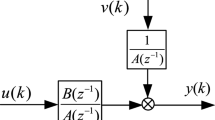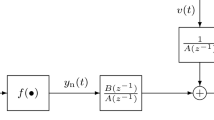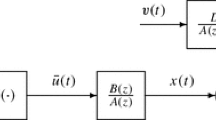Abstract
This paper proposes an Aitken-based stochastic gradient algorithm for ARX models with time delay. By using the redundant rule, the ARX model can be transformed into an augmented model. Based on the Aitken method, the parameters of the augmented model can be estimated, and then, the unknown parameters of the ARX model and the time delay can be computed. The performance of the Aitken-based stochastic gradient algorithm is then analyzed. Furthermore, a numerical example and a real system example are provided to show the effectiveness of the proposed algorithm. Compared with the traditional stochastic gradient algorithm, the Aitken-based stochastic gradient algorithm achieves better convergence performance that the parameter estimation errors converge below 3% in both examples after 400 steps.


Similar content being viewed by others
References
M.S. Ali, J. Yogambigai, Synchronization of complex dynamical networks with hybrid coupling delays on time scales by handling multitude Kronecker product terms. Appl. Math. Comput. 291, 244–258 (2016)
O. Bumbariu, A new Aitken type method for accelerating iterative sequences. Appl. Math. Comput. 219(1), 78–82 (2012)
Y. Cao, P. Li, Y. Zhang, Parallel processing algorithm for railway signal fault diagnosis data based on cloud computing. Future Gener. Comput. Syst. 88, 279–283 (2018)
Y. Cao, L.C. Ma, S. Xiao et al., Standard analysis for transfer delay in CTCS-3. Chin. J. Electron. 26(5), 1057–1063 (2017)
Y. Cao, Y. Wen, X. Meng, W. Xu, Performance evaluation with improved receiver design for asynchronous coordinated multipoint transmissions. Chin. J. Electron. 25(2), 372–378 (2016)
J. Chen, F. Ding, Modified stochastic gradient algorithms with fast convergence rates. J. Vib. Control 17(9), 1281–1286 (2011)
J. Chen, F. Ding, Y.J. Liu, Q.M. Zhu, Multi-step-length gradient iterative algorithm for equation-error type models. Syst. Control Lett. 115, 15–21 (2018)
J. Chen, B. Huang et al., Variational Bayesian approach for ARX systems with missing observations and varying time-delays. Automatica 94, 194–204 (2018)
J. Chen, J.X. Ma, Y.J. Liu et al., Identification methods for time-delay systems based on the redundant rule. Signal Process. 137, 192–198 (2017)
M.Z. Chen, D.Q. Zhu, A workload balanced algorithm for task assignment and path planning of inhomogeneous autonomous underwater vehicle system. IEEE Trans. Cogn. Dev. Syst. (2018). https://doi.org/10.1109/TCDS.2018.2866984
J.L. Ding, Recursive and iterative least squares parameter estimation algorithms for multiple-input–output–error systems with autoregressive noise. Circuits Syst. Signal Process. 37(5), 1884–1906 (2018)
J.L. Ding, The hierarchical iterative identification algorithm for multi-input–output–error systems with autoregressive noise. Complexity. Article ID 5292894, 1–11 (2017). https://doi.org/10.1155/2017/5292894
F. Ding, X.H. Wang, Hierarchical stochastic gradient algorithm and its performance analysis for a class of bilinear-in-parameter systems. Circuits Syst. Signal Process. 36(4), 1393–1405 (2017)
F.Z. Geng, S.P. Qian, An optimal reproducing kernel method for linear nonlocal boundary value problems. Appl. Math. Lett. 77, 49–56 (2018)
P.C. Gong, W.Q. Wang, F.C. Li, H. Cheung, Sparsity-aware transmit beamspace design for FDA-MIMO radar. Signal Process. 144, 99–103 (2018)
Y. Gu, F. Ding, J.H. Li, States based iterative parameter estimation for a state space model with multi-state delays using decomposition. Signal Process. 106, 294–300 (2015)
Y. Guo, B. Huang, State estimation incorporating infrequent, delayed and integral measurements. Automatica 58, 32–38 (2015)
J. Guo, Y.L. Zhao, C.Y. Sun, Y. Yu, Recursive identification of FIR systems with binary-valued outputs and communication channels. Automatica 60, 165–172 (2015)
J.N. Li, W.D. Bao, S.B. Li, L.S. Li, Exponential synchronization of discrete-time mixed delay neural networks with actuator constraints and stochastic missing data. Neurocomputing 207, 700–707 (2016)
J.N. Li, L.S. Li, Mean-square exponential stability for stochastic discrete-time recurrent neural networks with mixed time delays. Neurocomputing 151, 790–797 (2015)
M.H. Li, X.M. Liu, The least squares based iterative algorithms for parameter estimation of a bilinear system with autoregressive noise using the data filtering technique. Signal Process. 147, 23–34 (2018)
X.Y. Li, B.Y. Wu, A new reproducing kernel collocation method for nonlocal fractional boundary value problems with non-smooth solutions. Appl. Math. Lett. 86, 194–199 (2018)
J.N. Li, Y. Zhang, Y.J. Pan, Mean-square exponential stability and stabilisation of stochastic singular systems with multiple time-varying delays. Circuits Syst. Signal Process. 34(4), 1187–1210 (2015)
X. Li, D.Q. Zhu, An improved SOM neural network method to adaptive leader-follower formation control of AUVs. IEEE Trans. Ind. Electron. 65(10), 8260–8270 (2018)
F. Liu, A note on Marcinkiewicz integrals associated to surfaces of revolution. J. Aust. Math. Soc. 104(3), 380–402 (2018)
Y. Liu, E.W. Bai, Iterative identification of Hammerstein systems. Automatica 43(2), 346–354 (2007)
F. Liu, H.X. Wu, A note on the endpoint regularity of the discrete maximal operator. Proc. Amer. Math. Soc. 147(2), 583–596 (2019)
F. Liu, H.X. Wu, Singular integrals related to homogeneous mappings in Triebel–Lizorkin spaces. J. Math. Inequal. 11(4), 1075–1097 (2017)
J. Pan, X. Jiang, X. Wan, W. Ding, A filtering based multi-innovation extended stochastic gradient algorithm for multivariable control systems. Int. J. Control Autom. Syst. 15(3), 1189–1197 (2017)
J. Pan, W. Li, H.P. Zhang, Control algorithms of magnetic suspension systems based on the improved double exponential reaching law of sliding mode control. Int. J. Control Autom. Syst. 16(6), 2878–2887 (2018)
J. Pan, H. Ma, X. Jiang, et al., Adaptive gradient-based iterative algorithm for multivariate controlled autoregressive moving average systems using the data filtering technique. Complexity. Article ID 9598307 (2018). https://doi.org/10.1155/2018/9598307
I. Pavaloiu, E. Catina, On a robust Aitken–Newton method based on the Hermite polynomial. Appl. Math. Comput. 287–288, 224–231 (2016)
Z.H. Rao, C.Y. Zeng, M.H. Wu et al., Research on a handwritten character recognition algorithm based on an extended nonlinear kernel residual network. KSII Trans. Internet Inf. Syst. 12(1), 413–435 (2018)
C. Wang, T. Tang, Recursive least squares estimation algorithm applied to a class of linear-in-parameters output error moving average systems. Appl. Math. Lett. 29, 36–41 (2014)
L. Xu, The parameter estimation algorithms based on the dynamical response measurement data. Adv. Mech. Eng. 9(11), 1–12 (2017). https://doi.org/10.1177/1687814017730003
L. Xu, F. Ding, Recursive least squares and multi-innovation stochastic gradient parameter estimation methods for signal modeling. Circuits Syst. Signal Process. 36(4), 1735–1753 (2017)
L. Xu, F. Ding, Iterative parameter estimation for signal models based on measured data. Circuits Syst. Signal Process. 37(7), 3046–3069 (2018)
L. Xu, F. Ding, Parameter estimation for control systems based on impulse responses. Int. J. Control Autom. Syst. 15(6), 2471–2479 (2017)
L. Xu, F. Ding, The parameter estimation algorithms for dynamical response signals based on the multi-innovation theory and the hierarchical principle. IET Signal Process. 11(2), 228–237 (2017)
L. Xu, F. Ding, Y. Gu et al., A multi-innovation state and parameter estimation algorithm for a state space system with d-step state-delay. Signal Process. 140, 97–103 (2017)
G.H. Xu, Y. Shekofteh, A. Akgul, C.B. Li, S. Panahi, A new chaotic system with a self-excited attractor: entropy measurement, signal encryption, and parameter estimation. Entropy 20(2), Article Number 86 (2018). https://doi.org/10.3390/e20020086
L. Xu, W.L. Xiong et al., Hierarchical parameter estimation for the frequency response based on the dynamical window data. Int. J. Control Autom. Syst. 16(4), 1756–1764 (2018)
Y.Z. Zhang, Y. Cao, Y.H. Wen, L. Liang, F. Zou, Optimization of information interaction protocols in cooperative vehicle-infrastructure systems. Chin. J. Electron. 27(2), 439–444 (2018)
W.H. Zhang, L. Xue, X. Jiang, Global stabilization for a class of stochastic nonlinear systems with SISS-like conditions and time delay. Int. J. Robust Nonlinear Control 28(13), 3909–3926 (2018)
Y.J. Zhao, A. Fatehi, B. Huang, Robust estimation of ARX models with time-varying time delays using variational Bayesian approach. IEEE Trans. Cybern. 48(2), 532–542 (2017)
N. Zhao, R. Liu, Y. Chen, M. Wu, Y. Jiang, W. Xiong, C. Liu, Contract design for relay incentive mechanism under dual asymmetric information in cooperative networks. Wirel. Netw. 24(8), 3029–3044 (2018)
Acknowledgements
This work is supported by the Joint Funds of the National Natural Science Foundation of China (No. U1734210), the National Natural Science Foundation of China (Nos. 61403165, K61603156) and the Qinglan Project of Jiangsu Province.
Author information
Authors and Affiliations
Corresponding author
Rights and permissions
About this article
Cite this article
Wang, C., Li, K. Aitken-Based Stochastic Gradient Algorithm for ARX Models with Time Delay. Circuits Syst Signal Process 38, 2863–2876 (2019). https://doi.org/10.1007/s00034-018-0998-y
Received:
Revised:
Accepted:
Published:
Issue Date:
DOI: https://doi.org/10.1007/s00034-018-0998-y




